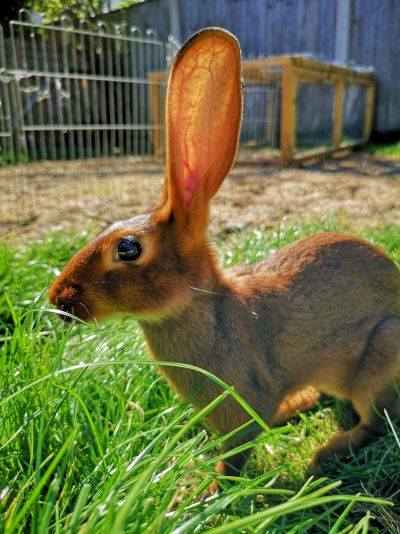
Posted By:
Over my years in Veterinary Practice, I’ve seen hundreds of rabbits with all sorts of ailments, major and minor. Some of these are due to infections, some are problems the rabbit was born with, some are linked to an inappropriate diet, and some are just bad luck. But the saddest of all are the illnesses that could have been prevented, and that’s why we recommend vaccinations.
There are two diseases we recommend vaccinating Rabbits against in the UK, and they’re both caused by viruses: Myxomatosis and Rabbit Haemorrhagic Disease (or RHD).
Myxomatosis was first introduced to Britain about 50 years ago, and it decimated the wild rabbit population at the time. Many people who walk in rural areas in the Autumn will have seen a wild rabbit suffering from “Myxi”. Their eyelids, mouths and noses are swollen and filled with pus, and so they are blind, unable to eat and in a great deal of pain. It’s invariably fatal. I’m unlucky enough to have seen the same disease in well-loved pet rabbits, and it’s heart-breaking. I have tried treating an infected rabbit once, but I’d never try again. The rabbit’s health deteriorated despite our best efforts, and we had to euthanase him after 2 days as he was suffering so much. His owners were desperately sad, as he was one of their five pet rabbits who all died of Myxi, one by one, over the course of 3 weeks. Myxi is spread by direct contact between rabbits, but also by biting flies and mosquitoes, so even indoor rabbits can catch the disease. We see most cases in the summer, when midges are about. Vaccinated rabbits can catch the disease, but signs are very mild, perhaps one or two little bumps on the face and a bit off colour for a few days, and they will recover fully without treatment.
RHD is a bit more sneaky. It causes internal bleeding, and often the rabbit passes away before showing any signs of being ill, so many cases go unreported to vets. There are two strains in the UK at the moment, RHD1 and RHD2. RHD1 has been around for several years. When it first arrived in the UK, it caused widespread losses in the wild rabbit population. RHD2 was first found in UK rabbits in 2013, and has been found in all parts of Britain in both wild and pet rabbits since then. Some wild rabbit populations have been all but wiped out by RHD2, one of the first being a massive and carefully monitored population that used to help manage the huge grassland campus around the University of East Anglia. Vets’ recommendations for vaccinating pet rabbits have changed over the last couple of years, and that’s because of the increasing risk of the disease. Initially only breeding and show rabbits seemed to be at risk of RHD2, but cases have now been seen even in pet rabbits in towns with no direct contact with other rabbits. It turns out that rabbits can be infected with RHD not only from direct contact with an infected rabbit, but also from an infected rabbit’s urine or faeces. Think how many of us go walking where wild rabbits live, then go home and wear the same shoes when cleaning out our rabbits, perhaps exposing our pets to a deadly infection. Wildlife such as rodents, birds and insects can do the same. RHD1, like Myxomatosis, is considered fatal. RHD2 infected rabbits do have a small chance of recovery with veterinary treatment, but it is very difficult to tell your rabbit is ill before the final stages.
We’re fortunate to have effective vaccinations available against these diseases. Myxomatosis vaccine should be given at least once a year. The effect lasts for at least 6 months, so we recommend vaccinating in the early Spring so your rabbit has best protection during the summer when biting flies are about. If we are aware of a local outbreak of Myxi, we’ll recommend a second vaccine in the Autumn, too.
Most vets offer a combined Myxi and RHD1 vaccine, but your rabbit will need a separate RHD2 vaccine as well. You need to wait at least 2 weeks between the two vaccines, they can’t be given at the same time. Again, if your vet considers your bunny to be at particularly high risk then he or she may recommend a booster every 6 months rather than once a year.
The vaccines are widely used and considered very safe, even in rabbits as young as 5 weeks old. Occasionally a vaccinated rabbit might be a bit off colour or have a localised skin reaction for a short time, but this will always resolve, and is much better than contracting one of these nasty viral diseases. And vaccinating not only protects your rabbit, but it helps reduce the spread of infection to other rabbits in Britain.
So, get your Hopper a Health Check and a Vaccination this Spring!
Photographs: Blue and Cherry, two beautiful Belgian Hares, who belong to our trainee Veterinary Nurse, Kim.
As our feline friends get older there are a few conditions...
Another winter discussion group season is now behind...
We used a client’s new Morris Remote Control...
©2024 Shepton Veterinary Group Ltd., All rights reserved.
Privacy Policy • Terms & Conditions • Cookie Policy